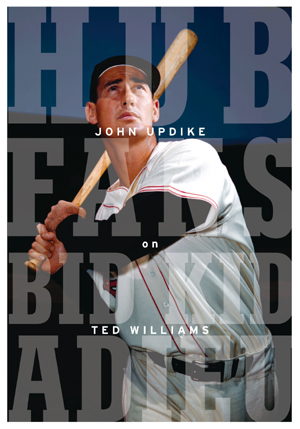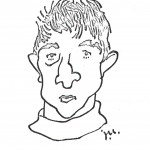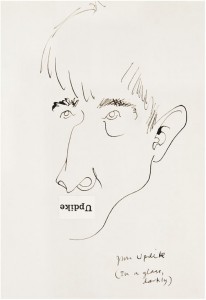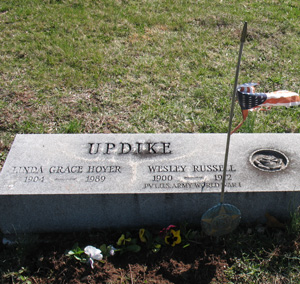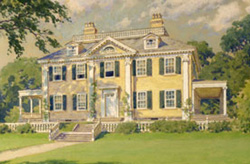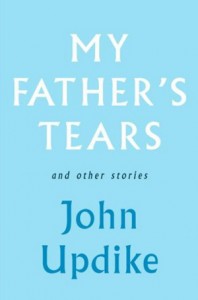 June 2 was the publication date for My Father’s Tears and Other Stories, John Updike’s first collection of new short fiction since 2000, and the reviews are starting to appear:
June 2 was the publication date for My Father’s Tears and Other Stories, John Updike’s first collection of new short fiction since 2000, and the reviews are starting to appear:
“Memory Arpeggios in Updike’s Sunset.” Michiko Kakutani. The New York Times Books. May 25, 2009. “In fact, this final volume of new Updike stories is, in many respects, a perfect bookend to ‘Pigeon Feathers,’ the precocious collection of stories that nearly five decades ago announced their 30-year-old writer’s discovery of his own inimitable voice.”
“BOOKS: John Updike books embrace a patchwork quilt of memories.” Vince Cosgrove. Star-Ledger. May 29, 2009. “If I can read this strange old guys mind aright, hes drinking a toast to the visible world, his impending disappearance from it be damned [sic].”
“’My Father’s Tears and Other Stories’ by John Updike; Book Review: A goodbye to John Updike.” Bob Hoover. Pittsburgh Post-Gazette. May 31, 2009. “Updike frequently referred to his native state as his true emotional home. In this [title] story, he makes it clear ‘that I have never really left Pennsylvania, that is where the self I value is stored, however infrequently I check on its condition.’”
“‘My Father’s Tears’: A master’s parting gift.” Harvey Freedenberg. BookPage: Where readers discover their next great book. June 2009. “All of the stories are distinguished by the hallmarks of Updike’s style: a graceful, almost liquid prose, a keenly observant eye and an unfailing ability to penetrate life’s mundane surface to test the currents flowing beneath it.”
“Book Review: My Father’s Tears & Other Stories.” Stefan Beck. Barnes & Noble Review. June 4, 2009. “The posthumous collection My Father’s Tears reminds us of one wonderful thing about Updike: Practically any example illustrates the point that he rarely missed his mark.”
“My Father’s Tears And Other Stories.” Zack Handlen. A.V. Club. June 4, 2009. “It’s a thoughtful book that favors reliability over surprises, and serves as a fitting conclusion to a remarkable career.”
Book review: “My Father’s Tears.” Brendon Volpe. Time Out New York. June 4-10, 2009. “There are gems like ‘The Varieties of Religious Experience,’ where Updike approaches 9/11 from the perspectives of several different characters, with a tender and honest touch as affecting as Don DeLillo’s Falling Man.”
“The Road Home.” T. Coraghessan Boyle. The New York Times Sunday Book Review. June 5, 2009. “Updike once described himself as ‘a literary spy within average, public-school, supermarket America.’ So he was. And these are his last smuggled dispatches, made all the more poignant for their finality.”
“Updike’s ‘Tears’ a farewell; Characters at the end of life look back in this somber final collection from John Updike.” Mark Athitakis. (Minneapolis-St. Paul) Star Tribune. June 5, 2009. “The book, much like ‘Endpoint,’ is Updike’s elegy for himself.”
“’My Father’s Tears’: This final collection of short stories from John Updike makes a fitting coda to his career.” Heller McAlpin. The Christian Science Monitor. June 6, 2009. “It is hard not to read this collection—as hyper-articulate and resonant as any he’s written, and to my taste, more convincing and evocative than his late novels—without a sense of loss.”
“Looking back.” Joel Yanofsky. The [Montreal] Gazette. June 6, 2009. “Short fiction was the form he mastered first, and Updike, who died last January, never faltered. Proof of that can be found in his posthumous collection. . . .”
“USA: ‘My Father’s Tears’ focuses on aging characters.” Colette Bancroft. Seniors World Chronicle: Digest of International News & Reports on Aging. June 6, 2009. “What burns brighter than ever, though, for these characters is memory—not of big, supposedly life-shaking moments like a wedding or birth or promotion or prize, but of experiences that didn’t even seem important at the time, or didn’t reveal their meaning until much later.”
“Review: John Updike’s posthumous publication ‘My Father’s Tears’ focuses on aging characters.” Colette Bancroft. St. Petersburg Times. June 7, 2009. “Memory, merciful and self-preserving and self-editing, in Updike’s hands is the armor with which we face our own relegation to the memory of others. My Father’s Tears is a moving, lovely coda.”
“Last writes: The late John Updike offers a few gems in his final collection.” Nancy Schiefer. Toronto Sun. June 7, 2009. “Although John Updike’s last book is not his best, impressive and familiar marks of the master storyteller remain.”
“Book Review: ‘My Father’s Tears’ and ‘Endpoint’ by John Updike: A double-barreled farewell, in poetry and prose, from an American icon.” John Freeman. Los Angeles Times. June 7, 2009. “’My Father’s Tears’ has a similar entropic downdraft [as Endpoint]; it’s an uneven and grimly literal collection of fiction that reprises—and repraises—the author’s childhood, chronicles the indignities of old age, describes in nearly guidebook fashion far-off travels and lingers over detritus found in a home that sounds very much like the one Updike occupied until his death.”
“’My Father’s Tears’: Updike’s Prose Garden.” Jennifer Shaw. New York Post. June 7, 2009. “While Updike is no longer part of the visible world, this collection proves that his impact on literature—and America—will never disappear.”
“’My Father’s Tears,’ by John Updike.” Adam Haslett. San Francisco Chronicle. June 7, 2009. “Coming at the end of a career as prolific as Updike’s, ‘My Father’s Tears’ will most likely be recorded as a minor event, a compilation of B-sides to more fully formed versions of the same material.”
Review: “My Father’s Tears.” Peter Wolfe. St. Louis Post-Dispatch. June 7, 2009. “‘My Father’s Tears’ is vintage Updike, its honesty and courage vaulting it to the top tier of its author’s many short-story collections.”
“Autumn sonatas: Updike’s last stories.” Doug Childers. Richmond Times-Dispatch. June 7, 2009. “Of course, while reading these stories about mortality, it’s hard to forget that their author has recently died; it lends the collection an aura of keen insight and even premonition. But even if Updike were alive today, they would resonate, I think. It’s a superbly intelligent, philosophically sustained collection.”
“The Examined, and Exhibited, Life; Updike was the consummate stylist with a blogger mentality.” Brad Leithauser. Slate Magazine. June 8, 2009. “Among American writers of his generation, Updike was unusual in his comprehensive effort to get the entirety of his life into fiction. . . . Yet a strange thing happened during his last decade: A different generation caught up with him.”
“Flights.” Julian Barnes. The New York Review of Books Vol. 56, No. 10. June 11, 2009. “Here come the desolating consolations of age. Escape may not lead to freedom; the skin remembers; the body rebels. Even adultery, that old reliable, becomes less commanding an impulse, easily loses its thrall.”
“Last writes: The late John Updike offers a few gems in his final collection.” Nancy Schiefer. The Kingston Whig Standard. June 13, 2009. “Although John Updike’s last book is not his best, impressive and familiar marks of the master storyteller remain. My Father’s Tears is a collection of 18 stories which, uneven yet often brilliant, catch and hold the reader’s attention.”
“A marriage of Updike: Volumes collect tales of his colorful couple, his last short stories.” Mike Fischer. The MIlwaukee Journal Sentinel. June 13, 2009. “Long after most of his novels are forgotten, people will continue to read John Updike’s short stories; they are the ideal form for what he did best: ‘give the mundane,’as he once put it in a foreword, ‘its beautiful due.'”
“Updike ponders life’s meanings; Death is theme of posthumously published book concluding half-century career.” Colette Bancroft. Akron Beacon Journal. June 14, 2009. “Memory, merciful and self-preserving and self-editing, in Updike’s hands is the armor with which we face our own relegation to the memory of others. My Father’s Tears is a moving, lovely coda.”
“Updike’s stories masterful to the end; Author first made his mark in short fiction, and he never falters in this collection of late work.” Joel Yanofsky. Edmonton Journal. June 14 2009. “The nuanced relationships between parents and children, husbands and wives, first and second, are at the heart of this book, and it’s seldom pretty.”
“‘Tears’ from Updike, ‘Mirrors’ from Galeano show masters at work.” Jeff Simon. The Buffalo News. June 14, 2009. “And his final book—the short story collection called ‘My Father’s Tears—is so good that even the wickedest, most ageist and blockheadedly Oedipal apostle of YOUTH would have trouble avoiding it.”
“Updike plumbs familiar themes, places of the heart.” William H. Pritchard. The Boston Globe. June 14, 2009. “Like many of his stories over the decades, the best of these last ones don’t read like ‘stories’ with a beginning, middle, and rousing end, but like reflective essays that explore a feeling, an inclination, in the direction of a clarifying moment.”
“A Toast to the Visible World: An American master’s Final Tales Live On.” Ron Hansen. The Washington Post. June 14, 2009. “‘My Father’s Tears’ is a self-conscious salute to a grand career of imagining and gorgeously describing our America, along with a wink of gratitude to those readers who have shared the journey.”
“‘My Father’s Tears: elegaic fiction by John Updike.” Robert Allen Papinchak. The Seattle Times. June 14, 2009. “One of the most telling stories and one likely destined for anthologies is ‘Varieties of Religious Experience.'”
“Updike’s elegy: Late writer’s last collection of short stories showcases his return to simple, deeply moving tales.” John Broening. The Denver Post. June 14, 2009. “A happy childhood perhaps gave Updike a few uncommon qualities as a writer: an intuition about the lives of ordinary people, an unironic love for his country and a humorous equanimity in the face of the hard realities of aging and death. Philip Roth’s take on old age is, by comparison, a cold howl of narcissistic rage . . . .”
“Review: ‘My Father’s Tears and Other Stories’ by John Updike; Updike looks back in autumn of his years.” John Barron. Chicago Sun-Times. June 14, 2009. “Frequently in these highly disciplined pieces, Updike leaps back into the ’30s, ’40s or ’50s and minutely describes scenes with such precision and awe that—like him—you’re stumped how/why we ever moved past such simplicity and the ordered fullness that reigned from the post-Depression years through the Eisenhower epoch.”
“Fiction: ‘My Father’s Tears.'” John Strawn. The Oregonian. June 19, 2009. “These stories, like the Rabbit novels, are a window into the world Updike chose to inhabit and explore. They are a pleasure to read, even when the subject matter is death or the anticipation of annihilation, because they are so honestly observed and scrupulously executed.”
“Book Review: My Father’s Tears and Other Stories.” John Davidson. The Austin Chronicle. June 19, 2009. “‘My Father’s Tears’ is brilliant and moving, flat-out humbling to the mere critic.”
“John Updike’s ‘My Father’s Tears and Other Stories.” John Anderson. Newsday. June 26, 2009. “The way Updike strips away the Presbyterian solace of his characters’ godly universe recalls Beckett. But this isn’t something new to ‘My Father’s Tears.’ In Updike’s writing, it’s always been there.”
“My Father’s Tears and Other Stories.” Leo Robson. The New Statesman. July 2, 2009. “Yet it remains the case, even as Updike’s death prompts memory of the good times, that his admirers, reading by way of mourning, will find most of the good times long in the past.”
“The master’s voice; John Updike’s late stories are not his best, but they are a lesson in love.” Martin Amis. The Guardian. July 4, 2009. “Considered as mere narratives, the stories are as quietly inconclusive as Updike’s stories usually are; but now, denuded of a vibrant verbal surface, they sometimes seem to be neither here nor there—products of nothing more than professional habit.”
“‘Tears’ a unique collection of Updike stories.” Smiley Anders. The Advocate (L.A.). July 5, 2009. “[‘Morocco’ is] a description of a vacation from hell that would fit nicely into the National Lampoon series of family disasters, with Updike in the Chevy Chase role.”
“Raising the last glass.” Anne Chisholm. Spectator Book Club, The Spectator (UK). July 8, 2009. “It is hard not to see the last story of all, published in The New Yorker in May 2008, as a farewell wave by Updike to his readers.”
“Last works of John Updike.” Staff. The Sydney Morning Herald. July 15, 2009. “Disappearance is a leading conceit in these fine stories, most of which centre on a divorced, remarried father in his 70s whose golfing buddies, poker partners, and business contacts have gone mostly to Florida or the grave.”
“A Review of My Father’s Tears; The final collection from a modern master.” Natasha Vargas-Cooper. BookBrowse: Your guide to exceptional books. July 8, 2009. “Updike’s sentences are acrobatic; they’re deft and complicated, and unlike any prose I’ve read before. Though it’s flowery it remains shockingly lucid.”
“Reaching the end; My Father’s Tears and Other Stories.” Gina Finn. Sacramento News & Review. July 16, 2009. “Updike’s repeated use of a male perspective can be frustrating and repetitive. Not only does My Father’s Tears lack a single female main character, but all the women in the various stories fall into one of two categories: the elderly wife or the mistress.”
“My Father’s Tears and Other Stories by John Updike; Endpoint and Other Poems by John Updike.” Nicholas Pierpan. The Times (UK). July 18, 2009. “Updike’s distinctive voice carries the collection, but overall its style falls short of his glittering best.”
“Updike’s writing after half a century remains as fresh as ever; in these short stories, the late, great author can sometimes reach near perfection.” Simon Baker. The Guardian (UK). July 19, 2009. “…when Updike gets it right—when the wonder of his prose, the energy of his narrative, the keenness of his eye and the rehabilitating warmth of his artistic mind are all firing—the reader is left with the sense of having encountered modern American fiction in its near-perfect state.”
“John Updike: The Final Ornament.” Michael Antman. PopMatters. July 22, 2009. “But the anxiety that lurked behind every one of his short stories and novels, that compulsion to cram in everything that had ever happened to him, was all too evident, and eventually shuffled him into the second rank of novelists.”
“My Father’s Tears & Other Stories, By John Updike; A new collection of John Updike tales alternately tugs at the heartstrings—and sadly frustrates.” David Baddiel. The Independent (UK). July 26, 2009. “Yet there are four stories in this collection, two near the start and two near the end, which approach Updike’s best work.”
“Updike’s last take; My Father’s Tears And Other Stories.” Harsh Desai. The Tribune (India) Spectrum. August 2, 2009. “In some of the precise details of his stories as also the observation one can see a life time’s experience.”
“Love, loss in the swinging 60s.” Sudipta Datta. The Financial Express (India). August 2, 2009. “In this collection, some of the stories are left open-ended, others aren’t able to connect with the reader, but four stories stand out.”
“Updike’s Joyous, Touching Final Story Collection.” Laurel Maury. NPR. August 14, 2009. “My Father’s Tears also has a quality, sometimes found in final books, of being filled with light and wonderment. It’s not only a fitting final book, but a joyous one.”
“My Father’s Tears: And Other Stories.” Christine M. Irvin. Bookreporter.com. Undated. “Dedicated fans will enjoy MY FATHER’S TEARS, while newcomers can expand their enjoyment by perusing the many other short stories and novels he has produced.”
“My Father’s Tears and Other Stories; By John Updike.” Joan L. Cannon. Senior Women Web. Undated. “So-called ‘happy endings’ do not seem to be part of Updike’s view. Still, his people appear to be well able to learn life’s bitter lessons and emerge without much biterness, and that is perhaps one of the primary marks of his basic humanity.”
As others appear, the links will be added here.
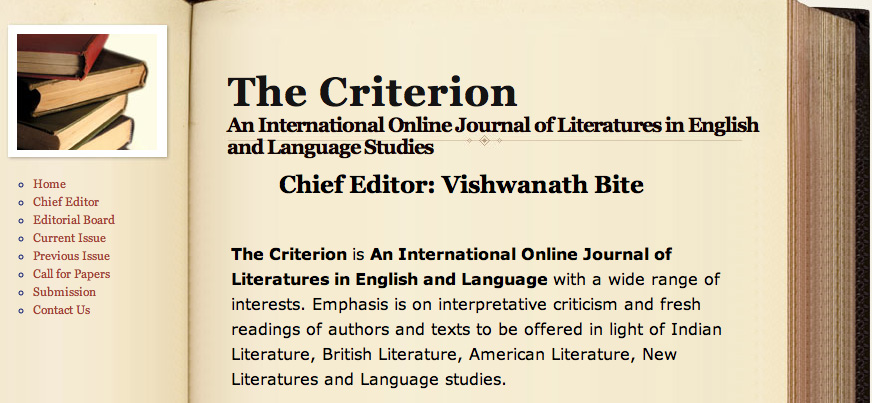 The Criterion: An International Online Journal of Literatures in English and Language Studies, has put out a call for Indian scholars to submit papers for a special issue on John Updike, to be titled “Indian Perspectives on John Updike.”
The Criterion: An International Online Journal of Literatures in English and Language Studies, has put out a call for Indian scholars to submit papers for a special issue on John Updike, to be titled “Indian Perspectives on John Updike.”
